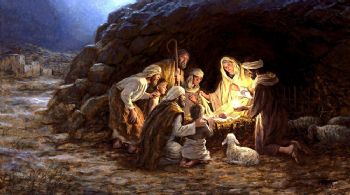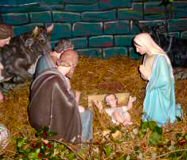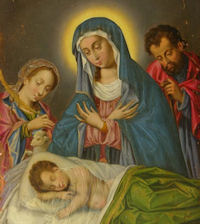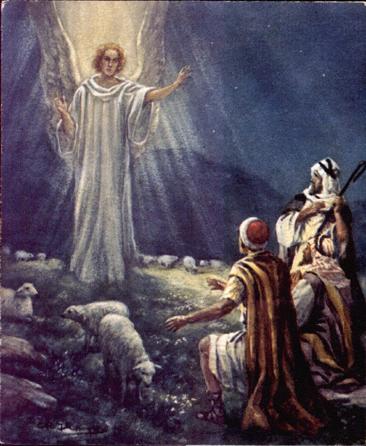The Humility that Heals – A Homily for Christmas

I. The Paradox of this Night - In a way, we are too familiar with the Christmas story, and so many of its strange paradoxes and stunning “absurdities” fail to shock and amaze us. And yet it does not take long to consider that no human being would ever craft this sort of entrance of God into our world.
Surely we would envision God’s entrance in Cecil B. DeMille proportions. (DeMille was producer of “The Ten Commandments” and other classic Hollywood Epics, in case I’m showing my age). Yes, there would be grand sets, a cast of thousands, palaces, trumpets, processions and signs and wonders seen by the whole world! Kings and Queens, heads of State, would be featured as among those first notified by Angelic Ambassadors of the imminent arrival of God, and they would set out to meet God in reverential fear. A palace or temple (on a lofty mountaintop) with polished marble floors, high ceilings and walls gilded with gold and fine carvings would be the place of God’s arrival. All would be in readiness for the arrival of God!
And when he came he would not come as an infant. He would not come as the reputed child of a peasant couple from a “hick town” in the north. No! God would come in all his glory, child of no one, and Father and King of All; very adult, indeed he would come as the Ancient of Days! He would descend on a kind of lightning bolt escorted by myriads of the heavenly hosts in a display so stunning that no one in the whole world could miss it.
And as for God’s enemies? They would cringe before his awesome glory, realize how wrong they had been, and either repent, or run away in a futile attempt to escape.
Yes! such is the entrance that fits our God; at least as we would design it.
And thus the real Christmas stuns us by its humble simplicity. And if we really ponder how different it is from any human standard, we cannot avoid saying, “Are you kidding?” Even the few details that mildly comport with our notions (angels, wise men, a star, emperor talk like Evangelion and Kyrios) are so understated. Only a few hidden souls even seem to notice or experience these .
And then there is the crushing poverty and utter humiliation. He comes as an infant. Yes! God as an infant! And not only is the Lord not born in a palace, as would befit him, he is not even born in a warm house. He is born in a filthy, smelly stable, not far from animal dung; a cave really, down beneath an Inn while people comfortably lodge above. An ancient antiphon of the Church speaks to our astonishment:
O magnum mysterium,(O great mystery)
et admirabile sacramentum, (and wondrous sacrament)
ut animalia viderent Dominum natum, That animals would see the newborn Lord
jacentem in praesepio! (lying in a manger (food trough))
Yes, it is a great mystery. Why all this? Why so hidden? Why so lowly? If God is going to enter and announce good news, why so secret? It is almost as though he doesn’t want to be seen or known! Why this “silent night” ?
In a word, “Humility.” How is pride to be conquered? By humility! Darkness cannot drive out darkness; only light can do that. Hatred cannot drive out hatred; only love can do that. And pride will not drive out pride; only humility will do that.
What does pride have to do with it? Everything! Satan in pride said, “I will not serve!” and so he, along with a third of the angels fell from heaven like lightning. Adam and Eve disobeyed God in pride saying, in effect, “I will not be told what to do. I will decide what is good and evil, I will know good and evil for myself and not be told by anyone, even God who gave me everything.”
This is pride. And God will conquer it with humility. He is born in a very low place, in grave need and poverty. He is acknowledged and praised only by a few “nobodies” and a few foreign wise men. Scripture says of Jesus lifetime of humility:
- Being in very nature God, He did not consider equality with God something to be used to his own advantage;rather, he made himself nothing by taking the very nature of a slave, being made in human likeness. And being found in appearance as a man, he therefore humbled himself, becoming obedient to death— even death on a cross! (Phil 2:4-8)
- For you know the grace of our Lord Jesus Christ, that though he was rich, yet for your sake he became poor, so that you through his poverty might become rich. (2 C0r 8:9)
Yes, this is God’s way. We humans try to fight fire with fire, violence with more violence, abused power with more abused power, and crime brings crime forever and the cycle of violence continuously spins. In striving to vanquish our foes, we become too much like them, and Satan wins no matter who loses.
But God catches Satan not by being like Satan, but by being different. He vanquishes hate with love, darkness with light, retribution with mercy, and pride with humility. God’s “foolishness” traps Satan and the worldly-wise in their own designs. Humility conquers pride because pride can only rush headlong into its own premises. In a battle against humility, to win means you lose! And thus Satan “won” at the cross, but, in the process, lost everything for He gave Jesus a chance to humbly obey and thereby undo prideful Adam’s disobedience.
And thus tonight the Lord comes humbly, silently, almost stealthily. His methods are utterly incomprehensible to a prideful world, governed by a prideful and fallen angel. But here he is, in all his puzzling paradox and we ought to pray and repent to understand even a little.
II. The Peace of this Night – In the midst of all this paradox where pride is overwhelmed by humility, comes this offered blessing for those, like the Shepherds, humble enough to hear it: and on earth peace to people of good will (Luke 2:14). Yes, though many angels spoke this, only a few were humble enough and had their wills disposed enough to hear it.
Peace…what is this peace that is offered to us? For too many, the word “peace” is something of an abstraction. We know it is the absence of war and conflict. But what is peace, more positively, more fully understood?
The Greek word translated here as “peace” is εἰρήνη (eirene) which most literally means, to join or tie together into a whole; to have wholeness; the experience we have when all essential parts are joined together. Peace is God’s gift of healing and wholeness.
And thus tonight, if you are I are humble enough to find Jesus in the humiliating and unexpected reality of his birth, he has this gift to offer you: peace, wholeness, integration, healing. But it is a gift offered in humility, and available only in humility and to the humble. It is not a gift we will find in the pride of our own agenda and expectations. Healing and wholeness come only through humility. Pride is poison, humility is healing.
And, as most of us know, who have lived long enough to experience it, our greatest healings and the deepest sources of our peace have come not from our strength, but from our weakness, from the difficult and painful moments of our life, from those moments when were were humbled enough to authentically cry out, “Help Lord!” And then he went to work.
Tonight the Lord enters our pain. He is found in poverty, in humiliation and even rejection. He is found in a low place, a cave where one has to stoop to enter. But this humility is necessary to overcome our pride.
And in the midst of the Lord’s humility and ours too, a little hand is stretched out, so little he can only hold our finger. Yes, in this humble place, with our humble God there is a healing, a gift of peace that is offered. And if we are humble enough to be of the good will to receive it, is ours.
Somehow an old song comes to mind. I have it on the best of the authority that one of the humble shepherds sang it on his way back from the humble cave, where the humble Lord’s infant hand took hold of his and the peace offered to those of good will became his. Yes, I have it on the best of authority that that humble shepherd sang this song:
Shackled by a heavy burden
Neath a load of guilt and shame
Then the hand of Jesus touched me
And now I am no longer the same
He touched me, oh he touched me
And oh the joy that floods my soul
Something happened and now I know
He touched me and made me whole
Since I met this blessed savior
Since he cleansed and made me whole
I will never cease to praise him
Ill shout it while eternity rolls
And on Earth, Peace, to all of good will.



 With the shepherds we hurry to the manger and adore the Incarnate Son of God, who for us and for our salvation descended upon earth. The purpose of the Christmas feast is beautifully expressed in the Preface of the Nativity: "For by the mystery of the Word made flesh the light of Thy glory hath shone anew upon the eyes of our mind; so that while we acknowledge Him a God seen by men, we may be drawn by Him to the love of things unseen."
With the shepherds we hurry to the manger and adore the Incarnate Son of God, who for us and for our salvation descended upon earth. The purpose of the Christmas feast is beautifully expressed in the Preface of the Nativity: "For by the mystery of the Word made flesh the light of Thy glory hath shone anew upon the eyes of our mind; so that while we acknowledge Him a God seen by men, we may be drawn by Him to the love of things unseen." 







